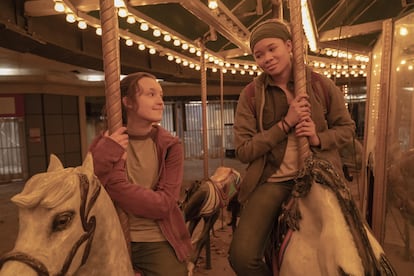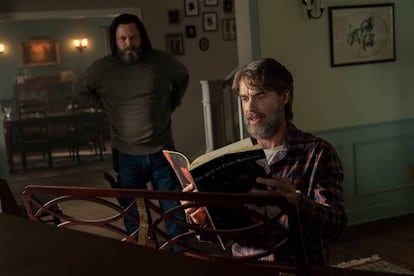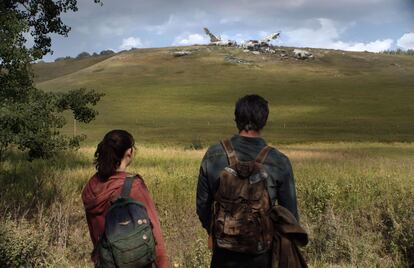Homosexuality, communism, and a menstrual cup: Why ‘The Last of Us’ is so triggering to conservatives
Every week, the popular HBO series prompts hateful complaints from reactionary, misogynistic, and homophobic viewers that ‘the woke agenda’ is ruining a series inspired by their favorite video game

“Buddy, your brand of ignorance and hate is exactly why we make stories like this,” the actor Nick Offerman recently quipped in a reply to a Twitter user who was complaining that Offerman’s portrayal as a gay man in The Last of Us had ruined the new hit HBO show. Both the tweet and the associated account were deleted soon thereafter, but the exchange nonetheless serves as an example of the sort of backlash inspired by the show’s third episode, “Long, Long Time.”
“This is The Last of Us, not Queer as Folk” one irate Twitter user wrote. Ultra-conservative political pundit Ben Shapiro went on an angry tirade, mocking the show as “Brokeback Zombie Farm” and attempting to disguise his homophobia as a form of purist dedication to the genre: “There are no zombies… It literally has nothing to do with the plot of the show,” he complained, despite acknowledging that he personally has never played the video game on which the show is based. Shapiro’s comment was widely repudiated by fans of the multi-million-dollar PlayStation hit. Since the show’s release, overanalyzing The Last of Us has become an obligatory weekly ritual, in which insults and outbursts abound.
The episode that has triggered the most hysteria among middle-aged men suffering psychological devastation from watching a film adaptation of a video game, narrates a beautiful, and beautifully acted, love story, set in the midst of a horrific post-apocalyptic hellscape. The episode is so well scripted, acted, directed and filmed that, after it aired, it quickly became the most talked about episode on television — a rare phenomenon in our era of seemingly infinite shows and streaming stations — leaving many viewers with the feeling that comes with knowing one has just witnessed the debut of an instant classic. It was one of those rare episodes destined to linger in our collective memory, like “The Constant” from Lost, or “Battle of the Bastards” from Game of Thrones.

Much of the hatred expressed toward the show centers on this love story, with complaints that it panders to the “gay agenda” and “woke culture” — which is to say, as the Merriam-Webster Dictionary defines the term, that it panders to a culture that “is aware of and actively attentive to important societal facts and issues (especially issues of racial and social justice).” This cultural controversy is no small matter: it is playing out in the context of an increasingly polarized battle that is reshaping the legislative and political landscape of the United States. Florida Governor Ron DeSantis, the leading Republican contender for the 2024 US presidential race, likes to say that “Florida is the place where woke goes to die,” and recently went to battle with Disney over the company’s rejection of a state law that seeks to censor gay content in schools.
Faced with escalating and compounding global crises of war, inequality, and environmental devastation, the conservative right has identified an even greater menace to Western Civilization: the vegan, gender-fluid millennial, who believes in LGTBI+ rights, is aware of climate change, and is skeptical of unbridled capitalism. It’s a laughable and out-of-touch antipathy, but you only have to take a stroll around the virtual world — or the real one, for that matter — to see that there are many who actually believe it.
Revenge of the trolls
Hatred of difference has found the perfect substrate, so to speak, in the anonymity of the internet. In the case of cultural productions like TV shows, this often manifests through “review bombing,” or intentionally posting bad reviews, in many cases before the show or film has even aired. Reviews on IMDB of the third episode of The Last of Us, which features the gay love story, for example, increased a hundredfold over the previous two episodes, and on Metacritic, the first two episode received outstanding ratings, but the third had a score of 4.8 out of 10.

This is not an isolated case, and the tactic is not new. Review bombing reached its peak with the release of Ghostbusters (2016), a remake of the 1980s classic that featured an all-female main cast, and it continues to happen anytime a science fiction production is released staring anyone other than heterosexual white men. It happened with Éowyn and Arondir in the Lord of the Rings, with the Ms. Marvel TV series (where, for added offense, the protagonist is Pakistani), and with the show She-Hulk: Attorney at Law. This last series, about an unmarried, green-skinned lawyer, decided to preempt its bad faith critics by depicting “incels” (deeply misogynistic “involuntary celibates”) as the (incompetent) nemeses of the show’s heroine.
The seventh episode of The Last of Us, “Left Behind,” which focuses on the queer romantic relationship between Ellie and her friend Riley, has been received with less overt hatred, but still a fair amount of disdain, with many condescendingly labelling it as a “filler episode” despite the fact that it portrays an essential part of the original plot. It is not an invention of the show’s “woke” screenwriters, but rather a faithful expansion on the storyline from the game. Ellie and Riley’s romantic relationship had already aroused waves of hatred among video game players, spoiling the desires of those who fantasized about a relationship between Joel and Ellie. A curious set of standards: Queer plots? No way. Pedophiliac plots? Yes please.
Bella Ramsey, who plays the show’s protagonist, Ellie, is used to life as a global celebrity. With just a few lines, she became the heroine that Game of Thrones fans didn’t know we needed. Nonetheless, nothing could fully prepare her for what came when she joined the cast of The Last of Us. As soon as it leaked that she would be playing Ellie, Ramsey faced a barrage of spiteful comments, judging her not for her ability to act, but because she supposedly wasn’t attractive enough. “It’s the first time I’ve ever had a negative reaction to something,” she told The New York Times. “There would be times I’d find it funny. Then I’d get to the end of a 10-minute scrolling session, put my phone down and realize: Maybe that was a bad idea.”

Ramsey is not the only protagonist of the series who has been insulted for her physique. Melanie Lynskey, who plays the vengeful Kathleen in episode four, was also a victim of body shaming. Model Adrianne Curry-Rhode replied to a photo of Lynskey on social media with the message: “Her body says life of luxury...not post apocolyptic [sic] warlord.” “Where is Linda Hamilton when you need her,” she added, referring to the star of Terminator. For the former America’s Next Top Model contestant, Lynskey was too “voluptuous” for the role. The New Zealand actress was unsparing in her response: “Firstly- this is a photo from my cover shoot for InStyle magazine, not a still from HBO’s The Last Of Us,” she tweeted. “And I’m playing a person who meticulously planned & executed an overthrow of FEDRA. I am supposed to be SMART, ma’am. I don’t need to be muscly. That’s what henchmen are for.”
Old zombies, same menses
Ever since Victor Halperin directed White Zombie in 1932, the zombie genre has been revisited ad nauseam, so that any new take that hopes to resist banality needs to give the formula some kind of a twist. Earlier in the pandemic, the co-creator of The Last of Us, Craig Mazin, who also wrote the exquisite miniseries Chernobyl, found himself in an aisle in a supermarket trying to decide what feminine hygiene products to buy for his wife and daughter. Since he wasn’t quite sure what they used, he had to call them.
“What do you use? How many packages should I get?” he asked, according to a recent profile in Vulture. This got him wondering how such an experience might play out in the show. “These are basic items that we’d need or would want,” he says. “In a postapocalypse, it’s annoying to have to deal with that and have a shortage of options. Why wouldn’t we show it? Especially because our co-lead is a 14-year-old girl. This is part of her life!” And thus, another scene that would draw thousands of charged comments online: the appearance of a menstrual cup in episode six. Most viewers praised the normalization of something as common as menstruating. “I am so obsessed with #TheLastOfUs finally showing us how people deal with menstruation in the apocalypse,” tweeted screenwriter Aiko Hilkinger.
I am so obsessed with #TheLastOfUs finally showing us how people deal with menstruation in the apocalypse pic.twitter.com/j7VHjLXKxb
— Aiko Hilkinger (@aikohwrites) February 20, 2023
“When you talk about women’s health, it’s all the stigma associated with it – you’re taught to be embarrassed,” female sexual health expert Dr. Shirin Lakhani explained to CNN’s Hafsa Khalil, who went on to write: “The casual reference to menstruation in a hit show like The Last of Us is a step to breaking this ‘taboo’ about talking about the monthly cycle experienced by 1.8 billion women, more than a fifth of the world’s population… Lakhani said ‘increasing awareness opens up the conversation’ about periods and the alternative sanitary products available. It can also help people such as single dads, who need to know how to help their daughters when they start to have periods, she added.” And according to TMZ, menstrual cup brands like The Flex Co. saw a 400% increase in sales in the two days after the episode aired.
When Maria, Joe’s sister-in-law, gave Ellie the cup, it wasn’t the first time an intimate feminine hygiene product has appeared in the series. In the third episode, Ellie rejoices after she finds a box of tampons (and let’s not forget that finding hidden objects is an essential feature of many video games). If “The Last of Us menstrual cup” yields some eight million results on Google, that’s because many viewers (including female viewers) had never heard of such a gadget, whose purpose the show makes viewers deduce, without over-explaining it: “We do this all the time in shows with things like guns,” Mazin told Vulture. “People don’t know how to load guns, and we don’t explain it to them. Why should we have to explain this?” Often associated with modernity and a desire to recycle, menstrual cups are not at all a recent invention — they’ve been around since the 1930s — and they can actually be reused for up to a decade. But the fact that they are now a symbol of female empowerment and an alternative to the ultra-polluting waste of pads and tampons, has made them sufficiently “woke” to generate controversy.
The cup was not Maria’s only contribution to the show that made the virtual ink flow. A few short lines of script sparked an umpteenth revolt among reactionary viewers. When Maria explains to newcomers Joey and Ellie that everyone in the community where she lives shares equally in the same resources, Joel jokes: “So, uh, communism.” His brother Tommy responds, taken aback: “Nah. Nah, it ain’t like that.” But Maria corrects him. “It is that, literally. This is a commune. We’re communists.” Even HBO itself stoked the flames on social media, tweeting the clip in question with the text: “Sounds like it’s communism.”
Sounds like it's communism. #TLOU pic.twitter.com/De9BAmHk7i
— HBO (@HBO) February 24, 2023
Of course, we can’t forget that Joel and Tommy are from Texas, a state where communism is an even bigger taboo than menstruation. The series has been accused of selling the commune as a utopian paradise, though it may ultimately prove more complicated than that, given the foreboding in the first part of the episode, when we meet an affable couple living in isolation in Wyoming, who warn Joel of the terrible things the community does to those who get too close.
The fact that a few lines of script, or an object as commonplace as a receptacle for menstrual blood, have become the subjects of fierce online debate, makes it clear that we are dealing with one of the most transcendent series of the year. It’s hard to say whether it will be for something positive or negative, but to be sure, next Tuesday, everyone will once again be talking about what happened the day before on The Last of Us.
Sign up for our weekly newsletter to get more English-language news coverage from EL PAÍS USA Edition
Tu suscripción se está usando en otro dispositivo
¿Quieres añadir otro usuario a tu suscripción?
Si continúas leyendo en este dispositivo, no se podrá leer en el otro.
FlechaTu suscripción se está usando en otro dispositivo y solo puedes acceder a EL PAÍS desde un dispositivo a la vez.
Si quieres compartir tu cuenta, cambia tu suscripción a la modalidad Premium, así podrás añadir otro usuario. Cada uno accederá con su propia cuenta de email, lo que os permitirá personalizar vuestra experiencia en EL PAÍS.
¿Tienes una suscripción de empresa? Accede aquí para contratar más cuentas.
En el caso de no saber quién está usando tu cuenta, te recomendamos cambiar tu contraseña aquí.
Si decides continuar compartiendo tu cuenta, este mensaje se mostrará en tu dispositivo y en el de la otra persona que está usando tu cuenta de forma indefinida, afectando a tu experiencia de lectura. Puedes consultar aquí los términos y condiciones de la suscripción digital.









































